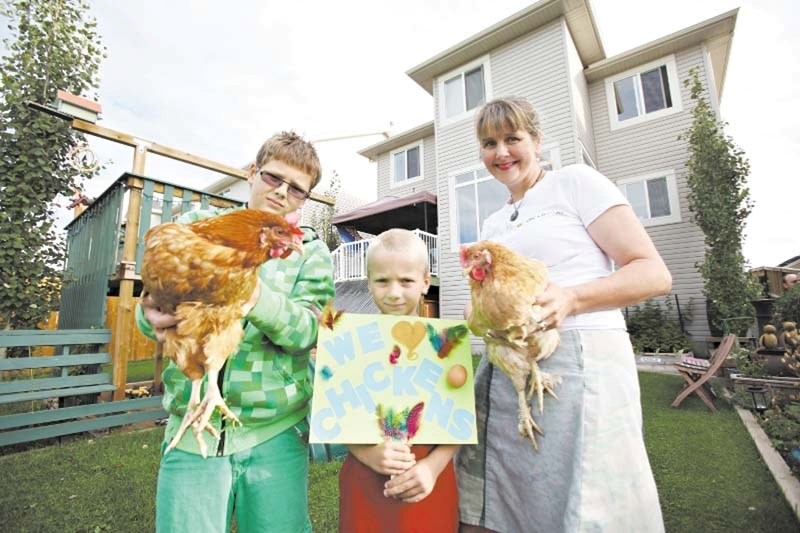Cluck Cluck Cochrane. Following the decision by Okotoks town council last week to draft its urban hen pilot project into policy, some Cochrane residents are getting ready to get their ducks, or chickens rather, in a row.
Cluck Cluck Cochrane.
Following the decision by Okotoks town council last week to draft its urban hen pilot project into policy, some Cochrane residents are getting ready to get their ducks, or chickens rather, in a row.
“I've been talking about it with my kids for so long, ” laughed Cochrane Heights resident and mother of two, Jennifer Walden. “I want to live in town, and not on an acreage, but I want the ability to control my own food production. ”
Following Okotoks' decision last week, the mother of two immediately formed the Facebook group: Cluck Cochrane and is beginning to work on an urban hen pilot project to present to Cochrane council.
“It's a healthy way to raise your own food and to teach children where food comes from - and that it doesn't actually come from the grocery store, ” added Shawna Kerr-Smith, a Glenbow resident and mother of two who will be working on putting together a proposal with Walden. She has also started a Cochrane chapter of the Canadian Liberated Urban Chicken Klub.
Kerr-Smith said the concept of urban hens ties into Cochrane's slogan: How The West Is Now.
For chicken lovers in Cochrane, the news clucks close to home - given the similarities to Okotoks with respect to population and proximity to Calgary.
Okotoks council, which voted 4-3 in favour of a one-year pilot project in 2014, voted unanimously in favour of implementing an Urban Hen Program last week.
Now, up to 18 successful applicants will be allowed to house up to three urban hens (sans roosters).
Jenni Bailey initiated the pilot project in Okotoks after a run in with the town's bylaw officers.
Bailey, who is the head of the Okotoks chapter of CLUCK, and her three children were keeping chickens in their backyard with the understanding that it was not illegal.
After bylaw asked Bailey to remove the chickens, she was inspired to create change.
That was the beginning of the 15-month pilot project at 12 Okotoks' residences that led to last week's decision to allow for permanent urban hens on a first-come, first-serve application basis.
“We had no issues, no complaints, ” said Bailey, who is thrilled about the success of the pilot and the future of the program.
“All those fears people have about urban hens - predators, noise, smell - it never happened. ”
Angela Clay, an Okotoks bylaw officer, said she feels the program exemplifies careful research and is a good example of implementing a program the right way.
“I think it's a good thing, in light of the fact we have had no issues surrounding the project, ” said Clay, confirming that municipal enforcement received no complaints during the pilot project.
An online petition opposing the Okotoks hen pilot project was launched in August 2015 and garnered eight signatures. Concerns cited included noise, smell, predator attraction and other issues relating to having “farm animals in an urban environment. ”
The Eagle made an effort to contact the initiator of the petition but was unable to do so by press time.
Clay said all known concerns were addressed through the pilot program.
Bailey said the process is regulated and applicants have a due process to follow, including building a coop and run as per bylaw requirements. Those requirements include minimum distance requirements from houses and lot lines; having their facility inspected by a bylaw officer before purchasing hens; ensuring their facility is kept clean and are compliant with proper domestic animal care; and that neighbours sign a form expressing their approval or citing their concerns.
Any concerns would be investigated by municipal enforcement but would not necessarily mean a licence for urban hens would not be granted.
The annual license fee in Okotoks is $30.
Bailey said the program is very much aligned with Okotoks' green movement and chicken waste can be placed in the green organic waste bins.
Her advice to other communities seeking to model a similar program?
“There's power in numbers, ” she said, emphasizing the importance of “creating a great relationship with your town council. ”
According to the Town of Cochrane's Animal Bylaw, Section 27 states: “No person shall keep livestock in any area of the town except where the keeping of livestock is allowed under the Town of Cochrane land use bylaw. ” The fine for keeping livestock in a prohibited area is $250
To date, municipal enforcement has not received any complaints about urban chickens in Cochrane.
Coun. Mary Lou Eckmeier, who has not taken a stance on the possibility of allowing urban chickens in Cochrane said “anything is possible ” and the first step would be for someone to make an application.
“How do we fit this in and how is it managed from a bylaw perspective? ” asked Eckmeier, adding that she is cognizant of concerns such as chickens being attractants for foxes and coyotes.
Bailey said Okotoks is also in a wildlife corridor and she has never had problems with her birds attracting predators.
